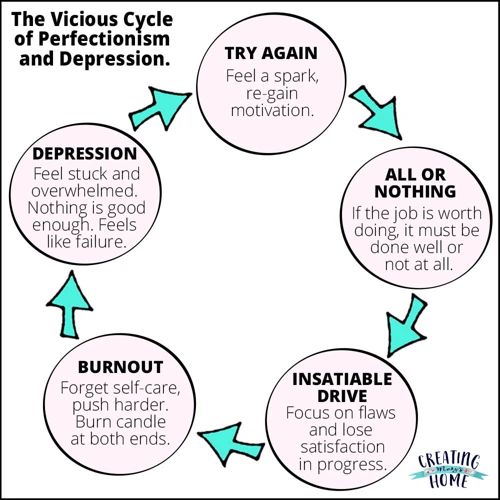Many people wake up in the middle of the night in a cold sweat, heart racing, and feeling an overwhelming sense of fear. These are the telltale signs of a nightmare, which can leave one feeling anxious and drained the next day. Interestingly, anxiety and nightmares are closely linked and have been the subject of much scientific inquiry. The complex relationship between the two is not yet fully understood, but recent research offers insights into how they intertwine and affect our overall mental health. In this article, we will uncover the scientific background behind the perplexing connection between anxiety and nightmares and provide practical tips on how to manage them for a better night’s sleep.
The Science behind Anxiety and Nightmares

It’s no secret that anxiety and nightmares can significantly impact the quality of our sleep. However, it’s surprising to learn that the two are closely connected, and there’s a considerable amount of scientific evidence to support this link. Understanding the science behind anxiety and nightmares can help us identify the causes and potential solutions to improve our sleep and overall wellbeing. Through exploring the role of the amygdala, the effects of stress hormones, and the impact of sleep disruption, we can gain a deeper understanding of this intriguing relationship. So, let’s delve into the science behind anxiety and nightmares.
1. The Role of Amygdala
The amygdala is a small almond-shaped structure located at the base of the brain, and it plays a crucial role in processing emotions. It is responsible for the body’s “fight or flight” response to perceived threats, such as a potential attack from a predator or a stressful situation at work.
When we experience anxiety, the amygdala becomes overactive and can trigger a state of hyperarousal. This can lead to an increased likelihood of nightmares, as the brain is more sensitive to negative or frightening stimuli.
Studies have shown that people with anxiety disorders have a higher overall level of amygdala activity, even when they are not actively experiencing anxiety symptoms. This suggests that their brains are more prone to overreacting to potential threats, which can increase the frequency and intensity of their nightmares.
Interestingly, research has also shown that the amygdala may play a role in the consolidation of memories during sleep. This means that the emotional content of a dream may be affected by the activity of the amygdala, making it more likely that anxious or frightening experiences will be incorporated into dreams.
The role of the amygdala in anxiety and nightmares highlights the complex interplay between emotions and sleep. While an overactive amygdala may contribute to the development of anxiety-related nightmares, other factors such as stress hormones and sleep disruption also play a significant role. Understanding this relationship is an important step in developing effective treatments for individuals who experience these issues.
| The Role of Amygdala |
|---|
| The amygdala plays a crucial role in processing emotions and triggering the body’s “fight or flight” response to threats. |
| People with anxiety disorders have a higher overall level of amygdala activity, making them more prone to overreacting to potential threats. |
| The emotional content of dreams may be affected by the activity of the amygdala during sleep. |
| Understanding the role of the amygdala in anxiety and nightmares is an important step in developing effective treatments. |
2. The Effects of Stress Hormones
Stress hormones play a significant role in the relationship between anxiety and nightmares. When we experience stress, our body releases cortisol, which prepares us for the “fight or flight” response. This response can trigger feelings of anxiety and can lead to nightmares during sleep. In addition to cortisol, another stress hormone that can impact our sleep is norepinephrine. This hormone can increase heart rate and alertness, making it more difficult to fall asleep and stay asleep.
Elevated levels of stress hormones can disrupt the normal sleep process, leading to a greater likelihood of nightmares. When we enter Rapid Eye Movement (REM) sleep, a phase of sleep where dreams and nightmares occur, our bodies should experience muscle atonia, or muscle paralysis, to prevent us from acting out our dreams. However, stress hormones can disrupt this process, leading to increased muscle activity during REM sleep and ultimately resulting in an increase in nightmares.
It’s important to note that while stress hormones can contribute to nightmares, not all individuals who experience stress will have nightmares. Other factors, such as genetics and past experiences, can also play a role in the development of nightmares.
3. The Impact of Sleep Disruption
Sleep disruption caused by anxiety can also lead to an increase in nightmares. When we experience anxiety, it can be difficult to fall asleep or to stay asleep during the night. This is because our minds are often racing with thoughts and worries. Additionally, the physical symptoms of anxiety, such as rapid heart rate and shallow breathing, can make it difficult to relax and drift off to sleep.
Here are some ways sleep disruption impacts our well-being:
- Difficulty falling asleep
- Difficulty staying asleep
- Increase in nightmares
- Tiredness and fatigue
- Poor concentration and memory problems
- Mood changes, such as irritability and depression
- Decreased immune system function
Unfortunately, this lack of sleep can also further exacerbate our anxiety, creating a vicious cycle. When we don’t get enough restful sleep, our bodies can become more susceptible to stress hormones, which can increase feelings of anxiety. This can lead to more sleep disruption and more nightmares.
It’s important to address both the anxiety and the sleep disruption to break this cycle. By treating the underlying anxiety, we can reduce the physical symptoms and decrease the likelihood of sleep disruption. In turn, by improving our sleep habits and patterns, we can improve our overall well-being and reduce feelings of anxiety.
Anxiety and Nightmares: The Vicious Cycle

Anxiety and nightmares have a strong correlation, creating a vicious cycle that can be difficult to break. Anxiety can lead to an increase in nightmares, and nightmares can increase anxiety – leading to a vicious cycle that can be difficult to break.
When we experience anxiety, our brain’s amygdala is activated, which is responsible for our emotional responses. Due to this activation, people with anxiety disorders are more likely to remember negative experiences, which can lead to recurring nightmares. When we have nightmares, our amygdala becomes activated once again, leading to increased anxiety and stress. This vicious cycle can cause both anxiety and nightmares to become more severe over time.
Stress hormones like cortisol can also contribute to this cycle. Increased levels of cortisol due to anxiety can result in more frequent and intense nightmares. Similarly, nightmares can trigger a stress response in the form of increased cortisol, leading to more anxiety.
Sleep disruption is another factor in this cycle. Nightmares can lead to difficulty falling asleep or make us wake up frequently throughout the night, resulting in disrupted sleep patterns. This lack of proper sleep can contribute to anxiety and increase the likelihood of nightmares. This, in turn, may lead to further sleep disruption, causing the vicious cycle to continue.
It is crucial to break this cycle for better mental health and quality of sleep. By understanding the cycle, we can begin to find ways to manage both anxiety and nightmares.
How to Manage Anxiety and Nightmares for Better Sleep
If you suffer from anxiety and nightmares, it’s essential to find ways to manage your symptoms to get better sleep. Consistent lack of sleep can negatively impact your physical and mental health. However, there are specific steps you can take to reduce anxiety and prevent nightmares from disrupting your sleep. In this section, we’ll explore some practical strategies and techniques that you can adopt to manage anxiety and nightmares and promote a better night’s sleep. Let’s dive into it!
1. Practice Good Sleep Hygiene
To manage anxiety and nightmares for better sleep, it’s important to practice good sleep hygiene. Here are some tips that can help:
- Create a relaxing bedtime routine: Establish a relaxing bedtime routine and stick to it every night. This could involve taking a warm bath or shower, reading a book, or meditating.
- Limit caffeine and alcohol: Avoid caffeine and alcohol before bed as they can disrupt your sleep.
- Avoid electronics before bed: Electronics emit blue light which can interfere with your natural sleep rhythms. Turn off your devices at least an hour before bedtime.
- Maintain a comfortable sleep environment: Make sure your bedroom is quiet, cool and comfortable. Invest in a comfortable mattress and pillows, and use blackout curtains if necessary.
- Stick to a regular sleep schedule: Try to go to bed and wake up at the same time every day, even on weekends. This can help regulate your body’s natural sleep-wake cycle.
- Don’t nap too much: Avoid napping during the day, or limit it to 20-30 minutes if necessary. Long naps can disrupt your sleep at night.
By practicing good sleep hygiene, you can create an environment that promotes restful sleep and reduces the likelihood of anxiety and nightmares disrupting your rest.
2. Practice Relaxation Techniques
One effective way to manage anxiety and nightmares is by practicing relaxation techniques. These techniques can help calm the mind and reduce stress levels, making it easier to fall asleep and stay asleep throughout the night.
There are various relaxation techniques you can try, including deep breathing exercises, progressive muscle relaxation, and visualization. Here’s a comparison table of different relaxation techniques:
| Technique | Description | Benefits |
|---|---|---|
| Deep Breathing Exercises | A technique that involves focusing on your breath and taking slow, deep breaths in through your nose and out through your mouth. | Reduces muscle tension, lowers heart rate and blood pressure, increases oxygen levels in the body. |
| Progressive Muscle Relaxation | A technique that involves tensing and relaxing muscle groups in your body, starting from your toes and working your way up to your head. | Reduces muscle tension, improves sleep quality, promotes relaxation. |
| Visualization | A technique that involves imagining a calming or peaceful scene in your mind, such as a beach or a forest. | Promotes relaxation, reduces stress and anxiety, improves mood. |
By practicing these relaxation techniques regularly, you can train your body and mind to relax more easily, making it easier to manage anxiety and prevent nightmares. It’s important to find a technique that works for you and to practice it regularly, especially before bedtime. This can help you establish a calming routine that prepares your body and mind for a good night’s sleep.
3. Seek Professional Help
Dealing with anxiety and nightmares can be overwhelming, and sometimes it’s best to seek professional help to tackle the issue. Here are some ways that seeking professional help can benefit you:
- Professional Guidance: A mental health professional can provide guidance and support in managing anxiety, stress, and nightmares. They can help you identify triggers, uncover underlying issues, and develop coping strategies tailored to your individual needs.
- Therapy: Therapy is a safe and effective way to work through emotional challenges that may be contributing to your anxiety and nightmares. A therapist can use various techniques such as cognitive-behavioral therapy (CBT) or exposure therapy to help you change negative thought patterns and behaviors that may be sabotaging your sleep.
- Medication: In some cases, medication may be prescribed to manage symptoms of anxiety or depression that may be contributing to your nightmares. A mental health professional can evaluate your symptoms and determine if medication is necessary or appropriate for your situation.
- Support: Seeking professional help doesn’t always mean therapy or medication. In some cases, just having a supportive person to listen to your concerns and provide guidance can be incredibly helpful. A mental health professional can offer emotional support, practical advice, and resources that can help you manage your anxiety and improve your sleep.
Remember, seeking professional help is a sign of strength, not weakness. It shows that you’re taking your mental health seriously and are committed to finding solutions to improve your well-being. If you’re struggling with anxiety and nightmares, consider reaching out to a mental health professional for support.
4. Mindfulness Meditation
One useful technique for managing anxiety and reducing the frequency and intensity of nightmares is mindfulness meditation. Mindfulness meditation involves focusing on the present moment and observing thoughts and feelings without judgment. By practicing mindfulness, individuals can learn to separate themselves from their anxious thoughts and emotions, and begin to recognize them as passing states rather than a permanent part of their identity.
There are various types and methods of mindfulness meditation that one can try, including guided meditations, breathing exercises, and body scans. One popular technique is the body scan, which involves slowly focusing on different parts of the body and observing any sensations, without judgment or trying to change them. This technique can be particularly helpful for individuals experiencing physical symptoms of anxiety, such as muscle tension.
Other mindfulness techniques, such as breath awareness or visualization, can also be effective in reducing anxiety and improving sleep quality. By regularly practicing mindfulness meditation, individuals can build a “mental muscle” for staying present and calm in the face of anxiety-triggering situations, which can ultimately reduce the frequency and intensity of nightmares.
It’s important to note that practicing mindfulness meditation can take time and effort, particularly for those who are new to the technique or struggle with anxiety. However, even a few minutes of daily practice can make a difference in managing anxiety and improving sleep quality. Additionally, individuals can seek out resources and guidance from mental health professionals or mindfulness teachers to help them develop a personal mindfulness practice that fits their needs and goals.
Conclusion
In conclusion, anxiety and nightmares have a complex and intertwined relationship. The science behind it indicates that the amygdala and stress hormones play a crucial role in triggering nightmares during periods of anxiety. Additionally, sleep disruption caused by anxiety can lead to a vicious cycle of more anxiety and more nightmares.
However, it is possible to manage anxiety and nightmares for better sleep. Practicing good sleep hygiene, such as maintaining a consistent sleep schedule and creating a conducive sleep environment, can help reduce anxiety and the likelihood of nightmares. Relaxation techniques such as deep breathing, progressive muscle relaxation, and visualization can also be helpful to calm the mind and body before sleep.
In more severe cases, seeking professional help from a therapist or mental health professional can provide effective treatment for anxiety and nightmares. Mindfulness meditation, a technique that involves training the mind to focus on the present moment, can also be helpful in managing anxiety and reducing the occurrence of nightmares.
Overall, it is important to recognize the link between anxiety and nightmares and take steps to address both in order to improve overall sleep quality and mental health. With the right tools and techniques, it is possible to break the cycle of anxiety and nightmares and achieve a better night’s sleep.
Frequently Asked Questions
What causes nightmares?
Nightmares can be caused by a variety of factors such as stress, anxiety, trauma, medication, and other sleep disorders.
How do anxiety and nightmares relate to each other?
Anxiety and nightmares have a bidirectional relationship. Anxiety can lead to nightmares, and nightmares can increase symptoms of anxiety.
Why does the amygdala play a role in nightmares?
The amygdala is responsible for processing emotions like fear, which can trigger nightmares when the brain is in a heightened state of anxiety or stress.
Is there a difference between nightmares and night terrors?
Nightmares occur during REM sleep and are accompanied by vivid and detailed dreams, while night terrors occur during non-REM sleep and cause intense fear and panic.
How can stress hormones affect our sleep?
Stress hormones like cortisol can disrupt the natural sleep cycle, leading to difficulty falling asleep and staying asleep. They can also trigger nightmares and other sleep disturbances.
What is sleep hygiene?
Sleep hygiene refers to the habits and practices that promote good sleep, such as maintaining a consistent sleep schedule, avoiding caffeine and electronics before bedtime, and creating a comfortable sleep environment.
What are some relaxation techniques that can help with anxiety and nightmares?
Relaxation techniques like deep breathing, progressive muscle relaxation, and visualization can help calm the mind and reduce symptoms of anxiety and stress.
When should you seek professional help for anxiety and nightmares?
If anxiety and nightmares are severely impacting your daily life and interfering with your ability to function, it may be time to seek the help of a mental health professional.
What is mindfulness meditation?
Mindfulness meditation is a type of meditation that involves bringing awareness to the present moment and accepting and observing thoughts without judgment. It can be a helpful tool in managing anxiety and improving sleep.
Can medication help with anxiety and nightmares?
In some cases, medication may be prescribed to manage symptoms of anxiety and improve sleep. However, it is important to discuss the risks and benefits with a healthcare professional and consider non-medication options as well.








